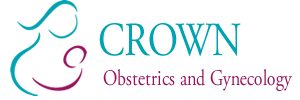
Perinatal Genetic Counseling
Expectant parents often have concerns about their baby's health before it is born.
If you and your partner are thinking about having a child, Crown OB/Gyn can help you learn valuable information about your baby's genetic health and whether to proceed with prenatal screening. We’ll perform an assessment of risk factors that you and your partner's family might have, as well as your medical and pregnancy history.
Our certified genetic counselors begin by working with you to develop a detailed family history, followed in some cases by specialized testing. This can include analysis of blood, amniotic fluid, or tissue samples to determine the biochemical, chromosomal, or genetic markers that can designate the presence or absence of specific conditions. We use the latest in genetic technologies, which can provide information about the fetus as early as the first trimester of pregnancy.
-
Along with genetics, the environment in which a fetus develops plays a critical role in whether a baby is born with physical or mental abnormalities. Statistically, a number of common factors may place a baby at greater risk, including:
A family history of birth defects, intellectual impairments, or genetic disorders.
A mother who is age 35 or older at delivery.
An abnormal maternal screening result during pregnancy.
Parents with a history of miscarriages or infertility.
A mother with a chronic disease, such as diabetes or seizures.
Exposure to certain medications or illnesses in pregnancy.
If warning signs are discovered during your prenatal genetic counseling, your Crown OB/Gyn physician will discuss your options with you. If you need additional prenatal screening, your doctor will explain the risks and benefits of each recommended screening.
-
Many people know they are at risk for a chromosome abnormality or a specific disease before they become pregnant. Our genetic counselors will gladly help a patient understand a particular genetic condition, research the availability of testing, arrange maternal and/or paternal testing if indicated, and coordinate prenatal testing if requested by the patient.
Crown OB/Gyn offers a variety of prenatal tests to determine genetic and physical development. Many involve DNA screening; others examine the baby’s physical structure. These tests include:
Prenatal ultrasound: This diagnostic tool uses sound waves to produce an image of the infant. Early in pregnancy (11-14 weeks), the measurement of the back of the fetal neck (nuchal translucency) can be used to determine the risk for abnormalities such as Down syndrome. Later in pregnancy it can help detect such structural defects as spina bifida and cleft lip.
Fetal echocardiography: This ultrasound test examines the structure and function of the developing baby’s heart at 20 to 22 weeks into the pregnancy.
Maternal blood screening: The newest non-invasive prenatal screening (NIPT) method uses the mother's blood to detect the presence of several chromosomal abnormalities, including Down syndrome and trisomy 18, with a detection rate of more than 98 percent.
Other forms of maternal blood screening look for the presence of spina bifida, a condition in which spinal vertebrae fail to form completely around the spinal cord, as well as fetal abdominal openings.
Amniocentesis: Usually done between weeks 16 and 20 of pregnancy, amniocentesis involves using a thin needle to extract a small sample of fluid from the mother’s uterus. The sample, which contains skin cells that are normally shed by the fetus into the amniotic fluid, is analyzed for chromosome and other abnormalities.
Chorionic villus sampling (CVS): This test, performed between weeks 11 and 13 of pregnancy, also involves retrieval of a small sample of the placenta, which is analyzed for chromosomes and other abnormalities.

